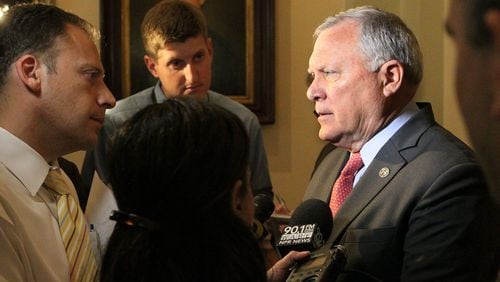The state ethics commission
Kevin Abernethy, chair
A partner at law firm Hall Booth Smith, Abernethy was appointed by Lt. Gov. Casey Cagle in 2010. Before his appointment, Abernethy was Cagle’s deputy legislative counsel and served as a legislative aide to Senate leaders. He also is a registered lobbyist. In the past he represented the Buckhead Coalition, Gwinnett Hospital System and New Jersey-based Summit Energy Partners.
He has contributed small sums to Republican candidates, including Cagle and Rep. Mike Jacobs, R-Brookhaven. He is a graduate of the University of Georgia and Georgia State University law school.
Hillary Stringfellow, vice chair
A lawyer for Brunswick firm Gilbert, Hall, Sumerford & Martin. Before serving on the ethics commission, Stringfellow served on the Judicial Nominating Commission. She was appointed by House Speaker David Ralston in 2010. She received both her undergraduate and law degree from the University of Georgia.
Heath Garrett
A lawyer with Turner, Bachman & Garrett and a partner with Stevens and Schreifer, a political campaign strategy firm. Garrett is U.S. Rep. Johnny Isakson’s former chief of staff. He has been a political strategist for Attorney General Sam Olens, Secretary of State Brian Kemp and the Georgia Republican Party. He graduated from the University of Georgia for both his undergraduate degree and his law degree.
Gov. Nathan Deal appointed him to the ethics commission in 2011.
Dennis Cathey
A founding partner at Cornelia law firm Cathey & Strain, Cathey was appointed to the ethics commission in 2011 by Deal. He is a former president of the Georgia Trial Lawyers Association and served on the Judicial Nominating Commission and on the State Bar Association’s committee on state legislation.
He also received both his undergrad and law degrees at UGA.
Two years ago, Stacey Kalberman gave her replacement as director of the state ethics commission some advice: watch out.
The job is political and you can get yourself fired, she told Holly LaBerge, the commission’s current director. LaBerge, who recounted the conversation in a deposition taken this summer, said she thought the warning was “a bit odd.”
Kalberman and her deputy say they were forced out at the commission amid their investigation into Gov. Nathan Deal’s campaign. Both former staffers have sued the state, and the details emerging from LaBerge’s depositions in those cases have revived a longstanding complaint: the ethics commission is a poor watchdog with a modest list of accomplishments that is politically beholden to the very officials it is supposed to regulate.
In the deposition, LaBerge said she was recruited by the governor’s office for the job and former staffers said she bragged that Deal “owed” her for how she handled the investigation into his campaign. Last week Deal angrily denied meddling in commission affairs, sharply criticizing The Atlanta Journal-Constitution and saying he doesn’t know Holly LaBerge. But the court documents renewed questions about the commission’s political independence.
The agency has only met twice this year. The AJC reported last year that civil penalties the commission levied for ethics violations had dropped 94 percent in five years. In the court papers that came to light last week, even a recent chairman calls the agency “a train wreck.”
“On the one hand, the commission is a prosecutorial body where we’re looking into complaints about people violating code sections and things,” said former Chairman Patrick Millsaps during his deposition in the Kalberman case. “On the other hand, we’re asked to sit as the judge in determining these things fairly as between the people doing the complaining and the prosecutors who happen to work for us.”
Kalberman’s attorney asked Millsaps whether there was a problem with a governor who is under investigation appointing commissioners.
“It’s not just the governor,” Millsaps said. “You’ve got the governor, you’ve got the Senate and you’ve got the House and the legislative body that funds the thing. It’s a mess.”
He left the commission in 2011, a few months after LaBerge was hired.
Steve Anthony, Georgia State University political scientist and former longtime top aide to House Speaker Tom Murphy, said the commission was not designed to be independent.
“It never has been and it never will be. It’s inherent in the system,” he said.
The commission dates to the post-Watergate 1970s, but Anthony was there when the Legislature tried to strengthen the panel in the 1990s.
He said some top lawmakers knew even then that it would never be truly independent. One House leader, Anthony said, wondered why they were bothering to fund a commission if it couldn’t function as an effective watchdog.
Robert Smith, political science professor at Savannah State University and an expert on state ethics commissions, said political interference is a problem at such agencies nationwide.
A major reason is that most commissioners are handed their jobs by their state’s most powerful politicians. Splitting those appointments up among several officials, as Georgia does, provides “some sort of balance,” but not much, Smith said.
“There needs to be another process to completely insulate the ethics commission from any possible specter of being under political influence,” he said. “The only way to do that is remove the appointment process from politics.”
The current commission, whose official name is the Georgia Government Transparency and Campaign Finance Commission, comprises four Republican lawyers, including one who was a lobbyist and a legislative aide to Lt. Gov. Casey Cagle and other powerful senators and another who is a partner for a political strategy firm.
Smith said appointments like that are “too close” to the political process and undermine the commission’s independence.
A bill in Georgia — Senate Bill 49 — would make the chief justices of the state Supreme Court and the state Court of Appeals responsible for appointing the board. That bill, sponsored by Democrats, has not been taken up by the Republican-led Senate.
Sen. Josh McKoon, R-Columbus, who has staked his young legislative career on toughening legislative ethics laws, said the commission needs financial independence to be effective. Currently, the commission must appeal to the governor and state lawmakers for money it needs to investigate them.
The commission’s budget has improved since LaBerge took over, but the $1.3 million appropriation still is 28 percent below the commission’s 2008 budget. McKoon said the office needs significantly more money to do its job.
“I think they are doing the absolute best job they can do with the resources they have,” he said. But, he added, “Anybody who has been through one of those procedures knows they are ultimately, fairly toothless.”
Former Gov. Roy Barnes, a Democrat, said he thinks the fact that lawmakers hold the purse strings has meant the commission has never been truly independent.
“The Legislature is always going to want to cut the budget. I had to fund it out of the governor’s emergency fund one year,” he said. “The way it should be done is you charge a filing fee for everything that comes in, and they keep the money.”
McKoon’s bill, Senate Resolution 7, would set aside .00025 percent of the state budget — somewhere between $4 million and $5 million, he estimates — to operate the ethics commission.
The bill, which did not move out of committee during this year’s legislative session, would require voters to approve a constitutional amendment. A similar bill sponsored by Senate Democrats also has not moved.
Rick Thompson, a former director of the commission who now runs a political consulting firm, said how much politics affects the commission depends on who is running it.
“You’re going to have (political) influence in the system if the individual you hire allows it,” he said. “There were certain politicians who tried to measure … if I was willing to do something for them.”
In a swipe at LaBerge, Thompson said, a director who goes “around boasting that you did something and somebody owes you something” may be perceived to be less than independent. Former staffers at the commission have claimed LaBerge made such statements about her handling of the Deal case, which resulted in most of the major complaints being discharged.
Thompson said today, the agency is not a true ethics watchdog. “I think it takes so long to be able to know what you’re doing, and there has been so much turnover, and because of the (leadership) choices they’ve made,” he said.
Democrats have seized upon the new details in the LaBerge deposition to state the obvious: The allegations and continued controversy around ethics commission undermine trust.
“Over the last several years, I – and I think the Georgia public – have become increasingly concerned that the ethics commission is not able to be an independent watchdog over elected officials who fund them and appoint them to serve,” Senate Minority Leader Steve Henson, D-Tucker, said. “I don’t believe it has the public’s confidence.”
Senate Minority Whip Vincent Fort, D-Atlanta, said the commission has been “denuded” of money and authority in recent years by Republicans in power. He called the end of Kalberman’s term as director, coming as it did amid an investigation into Deal’s campaign, “as brazen a power play as I’ve seen down here at the Capitol. I think that was a turning point. What followed was the politicization of the commission.”
In sworn testimony, LaBerge has claimed she was contacted by Deal’s office to gauge her interest in Kalberman’s job a month before Kalberman’s showdown with the commission over a cut in her salary. After taking the job, LaBerge said she began the task of narrowing the Deal probe. Other commission staffers claim LaBerge ordered documents removed from the governor’s file.
“If what we are hearing is in fact true, this commission is politicized to the point of not only being ineffective, but part of the cover up,” Fort said.
When the Democrats were in power and appointing the commissioners, the Republicans were the ones who cried foul, but some Democrats did not think it was independent, either.
Lewis Massey, a former secretary of state and a longtime lobbyist, was hit with an ethics charge during his run for governor in 1998. Massey was accused of taking a contribution during an earlier campaign from an entity he regulated. Massey argued at the time that the commission was biased in favor of Barnes, his Democratic primary opponent, because the chairman and vice chairman had contributed to Barnes.
“In our experience in the late 1990s, it is no secret that we felt some of the commission members were not objective in their deliberations,” he said.
For her part, LaBerge wondered whether Kalberman’s own political agenda shaped the investigation into Deal and another complaint against a consulting firm that paid to take House Speaker David Ralston, R-Blue Ridge, to Europe in 2010.
“I’m not sure how you can be unbiased when you’re handling cases if you are looking at them through the lens of a political motivation,” she said in her deposition. “So it was very obvious to me that she was looking at these two high-profile Republican cases as being political in some form or fashion.”
She said she “really didn’t trust” Kalberman. That distrust appears to be a common reaction to the state’s primary ethics agency.








